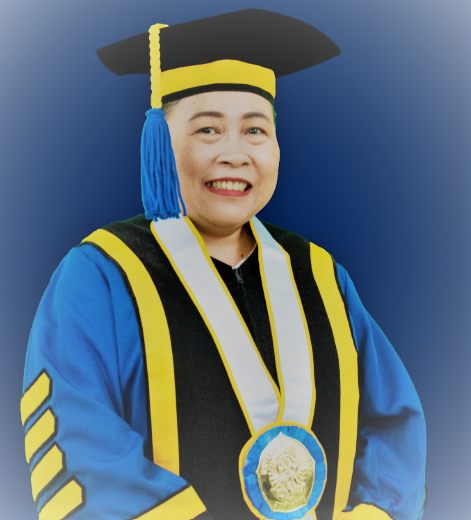
fsm.undip.ac.id SMAN 01 Tegal should be proud because one of its best alumni has been confirmed as a Professor. The daughter of Tegal is Prof. Dr. Dra. Dwi Hudiyanti, M.Sc, officially achieved the highest academic degree in Biophysical Chemistry at the Faculty of Science and Mathematics (FSM) of Diponegoro University (UNDIP). Prof. Dwi, as he is called, has been involved in Biophysical Chemistry. He found that in the medical world there are quite a number of incidents of drug efficacy that are not as promised as benefits, and sometimes even unwanted side effects such as occurs in cancer treatment.
“Seeing this problem, I was moved to contribute to finding a solution, namely through delivery or administration of the drug. Supported by colleagues and students, we strive to develop effective drug delivery,” said Prof. Dr. Dra. Dwi Hudiyanti, M.Sc, at his inauguration as Professor of Biophysical Chemistry at the Faculty of Science and Mathematics (FSM) Diponegoro University (UNDIP), Thursday (27/5/2021).
Explained by the professor who teaches 20 courses everyday, it’s wrong one problem big in an effort to treat is a non-conformance effect the expected from drug administration. Or it could be the emergence of side effects that are relatively as damaging as the disease itself. In general, this occurs due to drugs that do not reach site target, or there is a problem with the delivery/delivery method.
Even the best drugs will not be able to provide the desired effect if they do not reach the target site in the body at the appropriate concentration and within the required timeframe. Several drugs, said Hudiyanti, who graduated from the Surface Chemistry and Colloids Masters program from Faculty of Science University of Bristol England in 1995; degraded chemically or enzymatically in the stomach while others cause irritation.
In case other drugs can dissolve with very fast and absorbed with very fast in the digestive tract. This can cause peak drug concentration in plasma becomes high in a short time which is then followed by rapid elimination of the drug, as a result the drug has a long duration of action. short. Apart from that some medicine no can via path oral, because will experience metabolism in liver before reaching the systemic circulation.
Hudiyanti, who completed her bachelor’s and doctoral degrees at the Faculty of Mathematics and Natural Sciences, Gajah Mada University, revealed that there was a problem with side effects that were too strong to hinder efficient treatment. To overcome this problem, he developed liposome nanocapsules which are designed in such a way that they can be effective, efficient, safe and reliable without being overshadowed by any adverse side effects. The designed liposome nanocapsules are also based on various natural phospholipid compounds native to Indonesia.
Pospolipids from natural sources that have been used, said the grandmother of three grandchildren, including coconut meat, sesame, candlenut, and koro beans. Some that have been tested with about 80% success are cucurmin, vitamin C and beta-carotene.
A liposome nanocapsule is described as a nanometer-sized capsule whose walls are composed of complex lipid molecules, known as phospholipid molecules. Liposomal nanocapsules are superior because they can deliver various types of drugs through various routes of administration, making them suitable for the treatment of cancer and viral infections.In its function as anticancer drug delivery, liposome nanocapsules offer a safe way of targeting drug delivery to cancer cells, helping to reduce cytotoxic side effects of drugs, and can be formulated as active targeting with an antibody-based approach. Nanocapsules can also be formulated as passive targeting through increased permeability and retention of blood vessels.
“Meanwhile, as a vaccine carrier, liposome nanocapsules have advantages such as having suitable physical chemical properties, release and circulation time, as well as proper drug stability and low side effects,” said Hudiyanti, who has also served as Head of the Chemistry Department of Undip FSM since year 2016.Indeed, the use of loposomal nanocapsules for medical needs still requires a series of processes that must be carried out together with medical and far-reaching experts. still. Its application must go through various clinical trials in various stages. However, lecturers in the courses Biophysical Chemistry ,Surface and Colloidal Chemistry, Active Ingredient Delivery Systems, and Biophysics Food This master’s degree program in chemistry ensures that the use of loposomal nanocapsules in cosmetics and food makes the process simpler.
He cited a survey conducted by Transparency Market Research (TMR), which projects that the liposome nanocapsule market is quite promising. According to TMR, the global market for liposome nanocapsules in 2027 will grow with a market value of USD 8 million (Rp 120 billion). Therefore, Hidiyanti and her colleagues at Undip, including her students, are trying to develop anticancer and vaccine delivery, sharpen theoretical studies on the stability of natural liposome nanocapsules, refine isolation methodologies and scale up production of liposome nanocapsules. natural and phospholipid isolate.
To his fellow lecturers, the alumni of SMAN 1 Tegal invites them to keep on looking for new breakthroughs in responding to various challenges that arise in every tri dharma activity. “For students, the application of chemistry is very broad. The basic ingredients available in Indonesia are also abundant. There are still many things we can do,” he concluded. (SPA)

